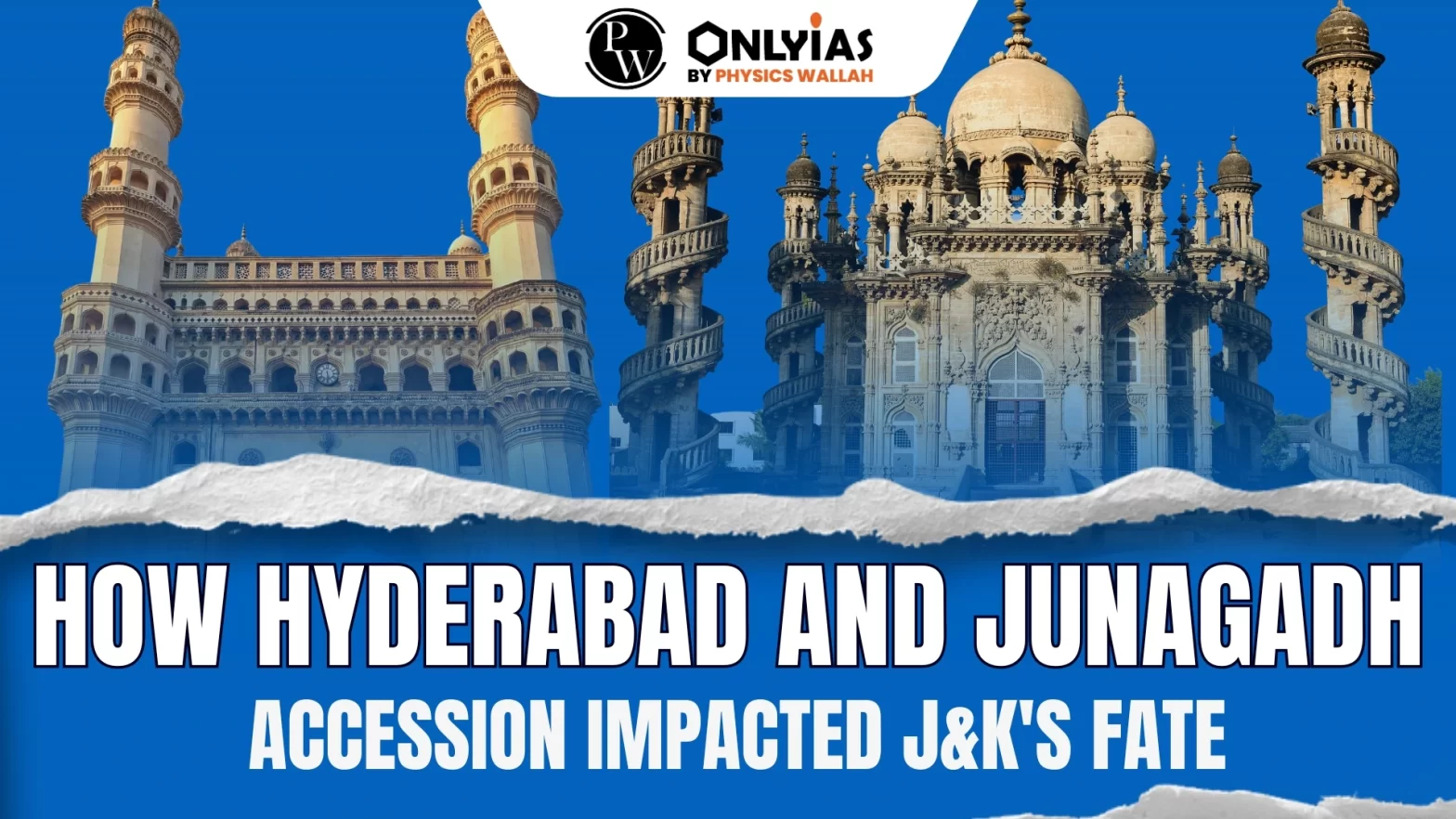Context: This article is based on an Editorial “Did Nehru commit ‘blunders’ on Kashmir: How Hyderabad and Junagadh accession impacted J&K’s Fate” Which was published in the Indian Express. Recently, the Union Home Minister outlined India’s first Prime Minister Jawahar Lal Nehru did not handle the Kashmir issue well.
What are the arguments presented by the Union Home Minister?
- Ceasefire Declaration Amid Military Success: The ceasefire (with Pakistan) was announced when our forces were winning.
- Ceasefire should have been announced once control over Kashmir was established.
- Internationalizing the Dispute: The Kashmir issue was taken to the United Nations.
- The United Nations called for a referendum which never took place as India said that Intruders must be thrown out.
Opposition Stand
- Responding to the Union Home Minister, the opposition leader claimed that Sardar Patel was prepared to let Kashmir go in return for Hyderabad, while Nehru wanted it in India.
- In her book, Kashmir in Conflict, Victoria Schofield says that even Mountbatten’s political advisor Sir Conrad Corfield recommended a barter while Nehru wanted to keep Kashmir in India.
Nehru, Patel, and Accession
- After the British left, two important princely states refused to join either India or Pakistan. Jammu and Kashmir had a Hindu ruler in a Muslim-majority state.
- Hyderabad had a very high-profile and very rich Muslim ruler in a Hindu-majority state.
- Both wanted independence.
Nehru and Patel’s Views on Jammu and Kashmir
- Nehru’s Views: Nehru was firm that Kashmir should be a part of India.
- Patel’s Views:
- Hyderabad: He was of the view that a hostile Hyderabad would be a “cancer in the belly of India”.
- Kashmir: He believed that “if the Ruler [of Kashmir] felt that his and his State’s interest lay in accession to Pakistan, he would not stand in his way” (from My Reminiscences of Sardar Patel, by V Shankar, his political secretary).
- However, Patel’s opinion about Kashmir changed on September 13, 1947, when Pakistan accepted the accession of Junagadh.
Accession Of Junagadh
- Background: Junagadh, was ruled by Nawab Muhammad Mahabat Khanji III. Initially, the Nawab had given indications of joining India. However, months before Independence, he got a new prime minister, Sir Shah Nawaz Bhutto (father of Pakistan’s future PM, Zulfikar Ali Bhutto).
- Upon Bhutto’s persuasion, the Nawab on August 14, 1947, announced he would join Pakistan,
- India’s Role: Incensed, India sent a small military to support two of Junagadh’s tributary states that did not agree with the Nawab’s decision.
- Junagadh’s residents too rose in protest. By November, the Nawab had fled to Karachi and Bhutto had to ask India to take over the province.
Accession of Hyderabad
- Hyderabad joining Pakistan was never a practical proposition.
- 3 months after Independence a standstill agreement was held between India and Hyderabad indicating that the ties will remain the same as that in British times.
- Nizam’s Atrocities: But in due course of time revolt against Nizam’s rule was increasing against large landholdings, forced labor, and excessive tax collection and demanded Democracy.
- Ittehad-ul-Muslimeen was getting more and more violent and its parliamentary wing
i.e. the ‘razakars’ attacked the opponents.
- Thereafter on September 13, 1948, the Indian army sent to Hyderabad under Operation POLO led to the surrender of Nizam’s forces.
Accession of Jammu and Kashmir
- Maharaja Hari Singh refused to accede to either dominion, preferring independence.
- In September, lorries carrying petrol, sugar, salt, clothes, etc. for J&K were stopped on the Pakistan side of the border, possibly to create pressure for accession.
- Hari Singh asked India for military help, and to secure this help, acceded.
Nehruvian Blunders
As mentioned by the Home Minister, one of the blunders by Nehru was going to the UN instead of defeating Pakistan. The reasons for this blunder are:
- Firstly under pressure from Louis Mountbatten
- Secondly the risk of war spilling outside Kashmir
- Thirdly the war was costing India dearly
- And lastly, the Indian government seems to have believed that a neutral forum like the UN would agree with India’s position.
- But India was shocked by British and American hostility as the US had seen Pakistan as a valuable asset against the Soviet Union and Britain did not want to oppose another Muslim country.
- Nehru himself regretted ever going to the UN. He told Mountbatten that “power politics and not ethics” were driving the UN, “which was being completely run by the Americans”.
- He went on to resist all demands of a plebiscite — from the UN to the Commonwealth — till all Pakistani intruders were out of Kashmir.
Conclusion:
The Union Home Minister asserts that Nehru’s decisions during the Kashmir issue, particularly the ceasefire declaration amid military success and the internationalization of the dispute at the United Nations, were strategic blunders. At the same time, the opposition leader claimed that Sardar Patel was prepared to let Kashmir go in return for Hyderabad, while Nehru wanted it in India.
| Prelims Question (2022)
With reference to the proposals of Cripps Mission, consider the following statements:
1. The Constituent Assembly would have members nominated by the Provincial Assemblies as well as the Princely States.
2. Any Province, which is not prepared to accept the new Constitution would have the right to sign a separate agreement with Britain regarding its future status.
Which of the statements given above is/are correct?
(a) 1 only
(b) 2 only
(c) Both 1 and 2
(d) Neither 1 nor 2
Ans: (b) |
![]() 11 Dec 2023
11 Dec 2023

